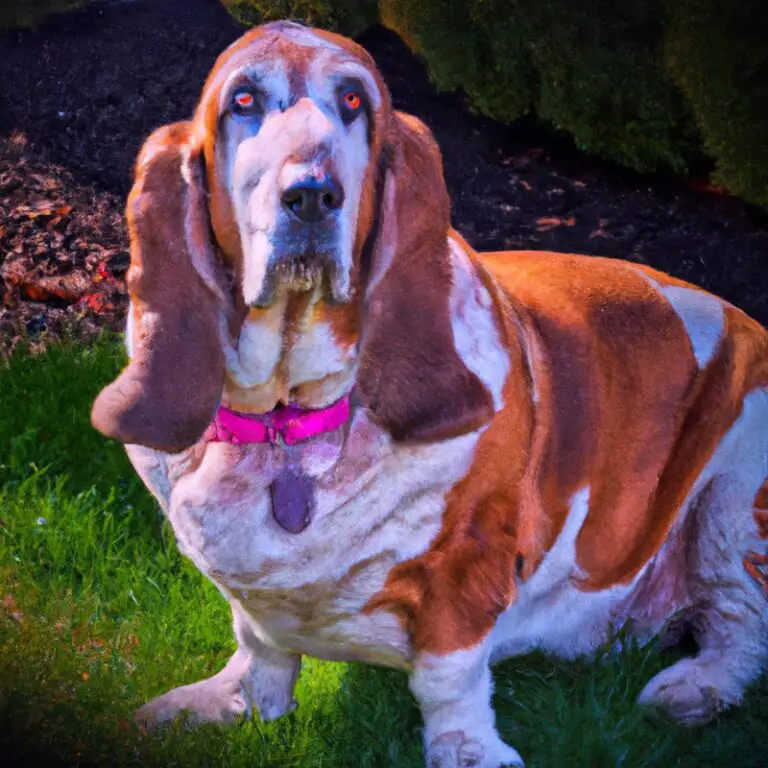Can Basset Hounds Be Trained To Be Therapy Dogs For Individuals With Depression?
Key Takeaways:
- Basset Hounds can be trained to be therapy dogs for individuals with depression.
- Their calm and gentle nature makes them well-suited for providing emotional support.
- Basset Hounds may require specialized training to address certain challenges.
- Proper socialization and consistent training are key for successful therapy dog candidates.
Are you feeling down or struggling with depression? Imagine having a loyal companion by your side, offering unconditional love and support.
Now, picture that companion as a Basset Hound, with their droopy ears and soulful eyes.
Intrigued? Well, let me tell you, Basset Hounds have the potential to be wonderful therapy dogs for individuals with depression.
In this article, I’ll delve into the role of therapy dogs in depression treatment, the unique qualities that make Basset Hounds ideal for therapy work, the training and socialization required, and the benefits they bring to those facing depression.
So, let’s explore if Basset Hounds could be the key to brightening your life and pulling you out of the darkness.
| Data | Information |
|---|---|
| Topic | Can Basset Hounds be trained to be therapy dogs for individuals with depression? |
| Question | Can Basset Hounds be trained as therapy dogs for people with depression? |
| Depression Therapy Dogs | Typically, therapy dogs can provide emotional support and comfort to individuals with depression. |
| Basset Hounds as Therapy Dogs | Although Basset Hounds have a sweet and gentle temperament, their stubborn nature can make them difficult to train for some specific tasks. |
| Potential Challenges | Basset Hounds may struggle with certain training commands and may have limitations in terms of being able to perform complex tasks required for specific therapy dog requirements. |
| Potential Benefits | Despite their challenges with training, Basset Hounds can still offer emotional support and companionship to individuals with depression. |
| Individual Differences | While some Basset Hounds may have the qualities and traits suitable for therapy dog work, it ultimately depends on the individual dog’s temperament, behavior, and training abilities. |
| Additional Training | To enhance their abilities as therapy dogs, Basset Hounds may require additional training and socialization to overcome their stubborn nature and learn specific tasks. |
| Consultation | Consultation with professionals, such as trainers and therapists, is recommended to determine if a Basset Hound is a suitable therapy dog for individuals with depression. |
Basset Hounds as Therapy Dogs for Depression
Understanding the Role of Therapy Dogs in Depression Treatment
Therapy dogs play a crucial role in depression treatment. These specially trained dogs provide emotional support and companionship to individuals with depression.
They help reduce feelings of loneliness, anxiety, and stress by offering unconditional love and comfort.
The presence of a therapy dog can also increase serotonin and dopamine levels, which are neurotransmitters associated with happiness and well-being. Therapy dogs can help elevate mood, provide a sense of purpose, and encourage physical activity.
They are wonderful allies in the journey towards mental health and can make a significant difference in the lives of those struggling with depression.
The Qualities of Basset Hounds for Therapy Work
Basset Hounds have several qualities that make them well-suited for therapy work. First, their calm and gentle nature is comforting to those experiencing depression.
They are excellent listeners and provide unconditional love and support.
Second, their low energy level means they can spend extended periods of time with individuals who may need extra attention. Their loyalty and patience also make them great companions.
Finally, their long ears and large eyes make them incredibly endearing and can help to bring a smile to someone’s face.
Basset Hounds are truly special therapy dogs.
Training Basset Hounds for Therapy Work
Training Basset Hounds for therapy work requires a combination of patience, consistency, and positive reinforcement. The key is to focus on their natural qualities, such as their calm demeanor and gentle nature.
Training should include obedience commands, socialization with different people and environments, and exposure to various sensory experiences.
It’s important to use rewards and treats to motivate them during training sessions. Gradually increase the difficulty level and duration of training exercises to prepare them for their therapy work.
With proper training and guidance, Basset Hounds can become excellent therapy dogs.

Socializing Basset Hounds for Therapy Work
Socializing Basset Hounds for therapy work is an important step in their training. It helps them become comfortable around different people and situations.
I focus on exposing them to various environments, sounds, and people from an early age.
I gradually introduce them to new experiences and reward positive behavior. It’s crucial to teach them basic commands and ensure they are well-behaved in public settings.
By giving them plenty of positive social interactions, Basset Hounds can excel as therapy dogs.

Certification and Registration for Therapy Dogs
Certification and registration are important steps in ensuring that a therapy dog meets the necessary standards for providing effective support. Organizations such as Therapy Dogs International (TDI) and the American Kennel Club (AKC) offer certification programs that assess a dog’s temperament, obedience, and social skills.
These programs often require a dog to pass a series of tests and evaluations.
Once certified, therapy dogs can be registered with various organizations, which helps them gain access to hospitals, nursing homes, and other facilities where their services are needed. It’s crucial to ensure that therapy dogs are properly certified and registered to ensure their reliability and safety in providing emotional support to individuals in need.

The Benefits of Basset Hounds as Therapy Dogs in Depression Treatment
Basset Hounds can bring numerous benefits as therapy dogs for individuals with depression. Firstly, their calm and gentle nature offers emotional support and companionship, helping to alleviate feelings of loneliness and sadness.
Secondly, their keen sense of smell can be utilized in scent-based therapies, as scents have been known to positively impact mood and reduce anxiety.
Additionally, the physical activity involved in caring for a Basset Hound, such as walking and playing, can promote exercise and outdoor time, which are important for mental wellbeing. Overall, Basset Hounds can provide unconditional love and comfort, making them valuable allies in depression treatment.
Considerations and Limitations of Using Basset Hounds as Therapy Dogs for Individuals with Depression
Using Basset Hounds as therapy dogs for individuals with depression has its considerations and limitations.
Here are a few to keep in mind:
- Low energy levels: Basset Hounds are known for their calm and low-energy nature, which can be beneficial for individuals with depression. However, their lack of energy may limit their ability to engage in more active therapeutic activities.
- Noise sensitivity: Basset Hounds have sensitive ears and may be easily startled by loud noises or sudden movements. This can be a challenge in environments with potential distractions or unpredictable sounds.
- Potential health issues: Basset Hounds are prone to certain health conditions, such as joint problems and obesity. Regular veterinary care and monitoring are crucial to ensure their well-being during therapy sessions.
- Size and mobility: Due to their long bodies and short legs, Basset Hounds may face difficulties accessing certain spaces or navigating obstacles. This may limit their ability to engage in therapy activities in certain environments.
- Individual compatibility: It’s important to consider individual preferences and comfort levels when matching a person with depression to a therapy dog. Some individuals may respond better to different breeds or personalities.
- Training and certification: While Basset Hounds can be trained for therapy work, it’s important to ensure they receive proper training and certification from reputable organizations. This ensures their ability to perform therapy tasks safely and effectively.
Each individual’s needs and circumstances should be taken into account when considering Basset Hounds as therapy dogs for individuals with depression.
Ongoing evaluation and adjustments are important to ensure the best possible outcome for both the individual and the therapy dog.
Finding a Qualified Basset Hound Therapy Dog
Finding a qualified Basset Hound therapy dog is an important step in utilizing their therapy abilities for depression treatment. Here’s how to go about it:
- Research reputable therapy dog organizations that specialize in Basset Hounds.
- Contact local therapy dog training programs or trainers who work specifically with Basset Hounds.
- Reach out to local Basset Hound breed clubs and ask for recommendations.
- Attend local dog shows or events where Basset Hounds are present and talk to owners who may have experience with therapy work.
- Connect with online communities or forums dedicated to Basset Hound owners or therapy dog enthusiasts and seek recommendations.
Remember, when finding a qualified Basset Hound therapy dog, it’s crucial to inquire about their training, certifications, and temperament assessments to ensure they are suitable for the role.
Final Verdict
Basset Hounds can indeed be trained to be therapy dogs for individuals with depression.
Their calm and affectionate nature, combined with their innate empathy, make them excellent candidates for this role.
By undergoing proper training and socialization, Basset Hounds can provide much-needed companionship, comfort, and emotional support to those struggling with depression.
While there are considerations and limitations to be aware of, the benefits of Basset Hounds as therapy dogs in depression treatment are undeniable.
If you’re searching for a qualified Basset Hound therapy dog, consult reputable organizations and trainers who can help connect you with the perfect furry companion.







